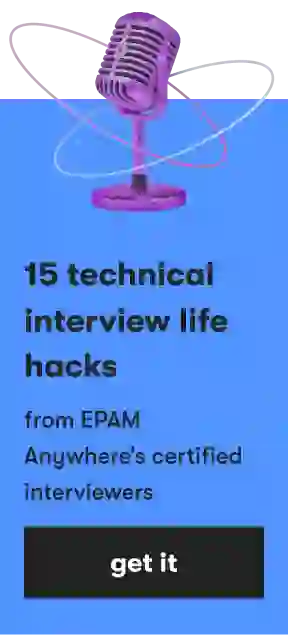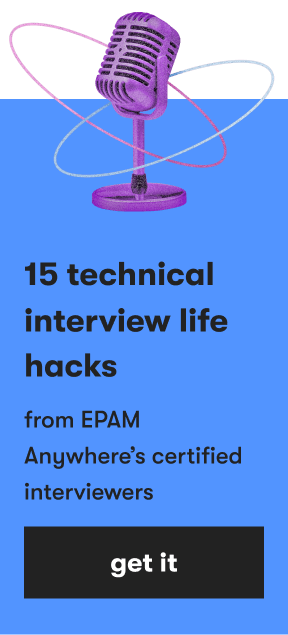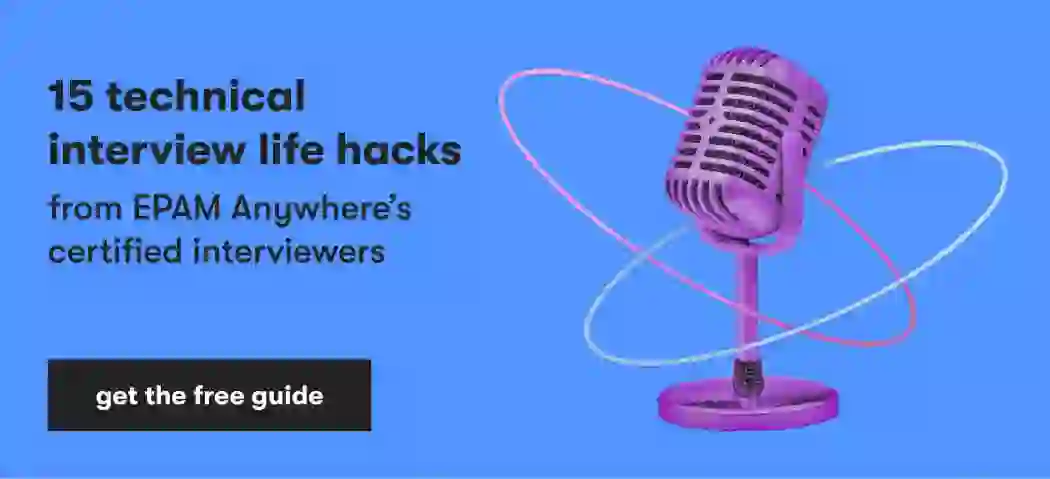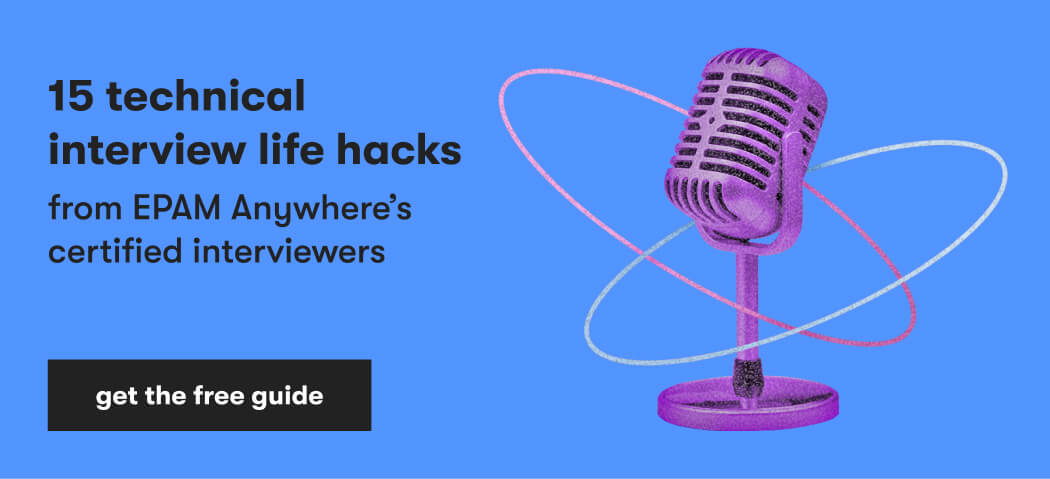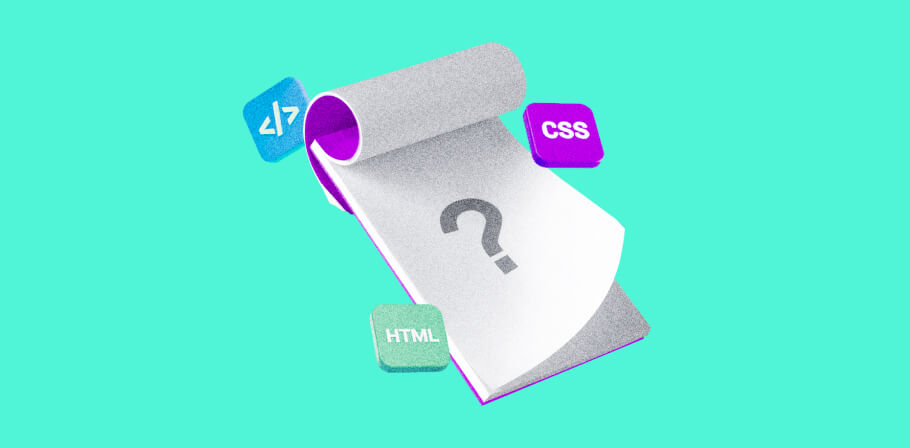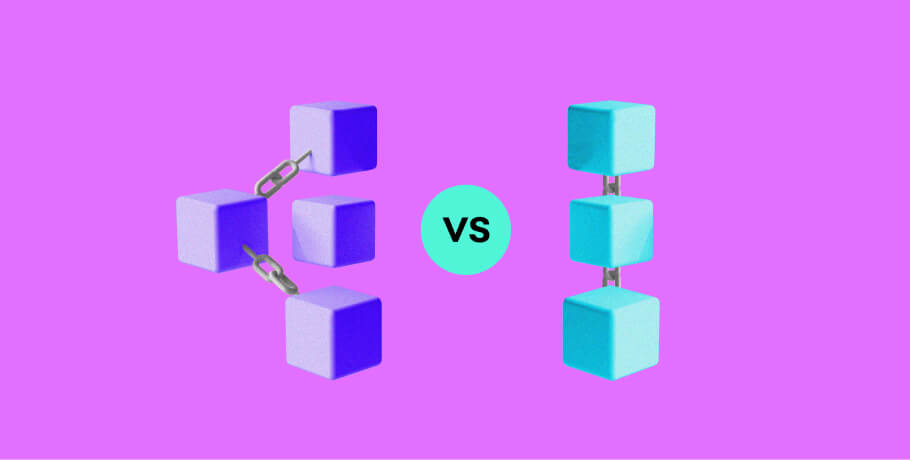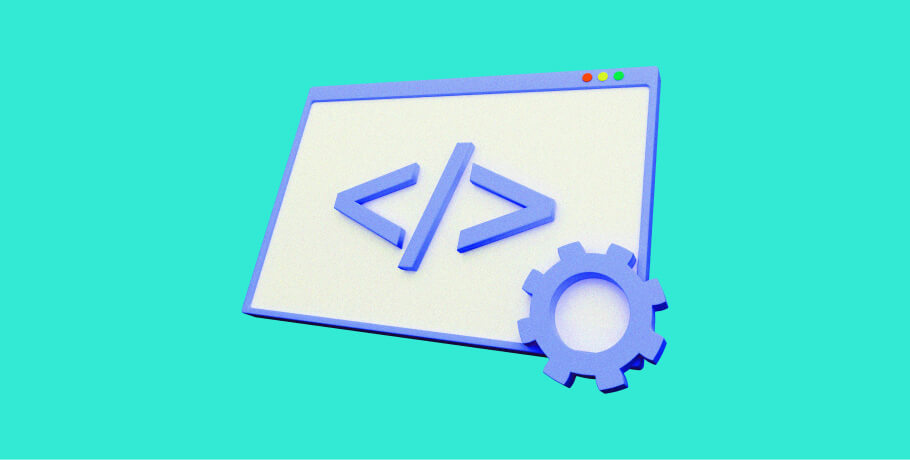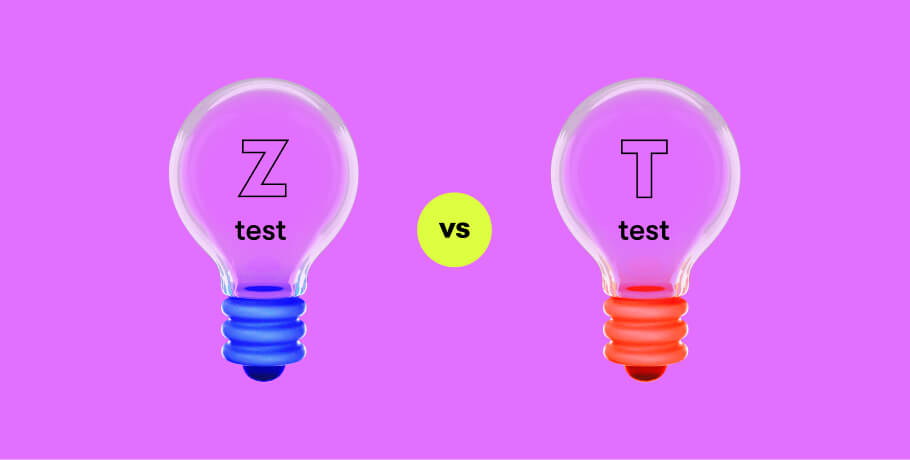Demand for software developers is on the rise. Even with millions of professionals working in the field, the software developer workforce isn’t large enough to fill every available position. That’s outstanding news for anyone seeking software developer jobs.
However, that doesn’t mean software developers won’t face stiff competition when trying to land a new role. Many software developer interview questions are highly technical, at times to the point where articulating an answer is challenging. Plus, behavioral interview questions are inherently tricky.
Fortunately, with a bit of preparation, you can be ready for what’s on the horizon. Whether you’ll face off against middle-level or senior software developer interview questions, here are some questions you’ll want to review. Some simply test your knowledge of terminology, while others ask you to explain complex processes. Here’s a look at what you may face off against:
ready for your next interview?
Send us your CV and we'll get back with a senior software engineer position to match you
1. What is a framework?
A framework is a tool that gives software developers access to prebuilt components or solutions designed to expedite development.
As a knowledge-based question, a simple answer demonstrating your knowledge is generally enough.
2. Name the stages of the software development lifecycle (SDLC)
The stages of the software development life cycle are:
- Planning
- Requirements gathering and analysis
- Design
- Coding and implementation
- Testing
- Deployment
- Maintenance
Like the question above, this one tests your knowledge. As long as you outline the stages, that’s usually sufficient.
3. Compare waterfall and agile models and provide examples of their use cases
The waterfall methodology is a sequential process where tasks are handled in a linear fashion. Generally, it’s best used when the requirements are clear, well-known, and entirely fixed.
The agile methodology uses an iterative process that relies on cyclic patterns with a high degree of collaboration. Agile provides ample room for feedback and future adjustments, making it a better fit in cases where goals and requirements may shift, or other unknowns are likely to arise.
With this answer, you can dive into examples from your past work to serve as use cases. That can add something extra to your response and may help you stand out.
4. What is refactoring?
Refactoring is the process of taking care of existing code and restructuring it, typically to improve the code through small changes without altering its underlying behavior.
With your answer, you can give an example of a previous experience that shows you know how to refactor code the right way. However, a simple definition is also enough.
5. How do functional requirements differ from non-functional ones?
Generally, functional requirements define a system's operation, while non-functional requirements outline how a solution should perform or behave.
One way to make this answer more impactful is to use a past project as an example. Discuss its functional and non-functional requirements, showing you understand the difference beyond the definitions.
6. Explain the concept of object-oriented programming (OOP)
Object-oriented programming is a model that centers on data fields with distinct behaviors and attributes — referred to as objects — instead of logic or functions. Developers focus on the objects that need to be manipulated instead of the processes required to manipulate them.
Like the question above, you can use examples from past projects to make your answer more compelling and show your understanding of differences between functional programming and OOP.
7. Have you ever created unit tests?
Unit testing involves taking small parts of an application — referred to as units — and independently scrutinizing them to ensure correct operation.
Since this question is experience-related, you’ll want to confirm whether you have experience in this arena. If so, provide an example from your past work where you used unit testing to achieve a goal.
8. What debugging tools do you use?
Here are some common debugging tools you might discuss:
- Affinic
- GDB
- LLDB
- Radare2
- Valgrind
- WinDbg
This is another question that focuses on individual experience. You’ll want to outline which debugging tools you’ve used during your career as a starting point. If you’re familiar with several, discussing use cases for each one can fill your answer out a bit.
9. What are the OSI model layers?
The Open Systems Interconnection (OSI) model layers are:
- Physical, transmitting raw bit data over a physical medium
- Data Link, defining the data format
- Network, defining the physical path for the data
- Transport, transmitting data using protocols
- Session, responsible for ports and sessions control
- Presentation, displaying data in a usable format
- Application, enabling human-computer interaction
10. Name API architectural approaches
Here is an overview of some API architectural styles:
- Event-driven
- Hypermedia
- Pragmatic REST
- Web API
11. What is CORS?
CORS, or cross-origin resource sharing, is an HTTP-header-based mechanism that lets a server define origins outside of itself where the browser should allow the loading of resources. Within CORS is a mechanism that ensures browsers reach out before a user request to confirm the server will support the request for the cross-origin resource.
If you have an example from a past project that involved CORS, discuss it to give your answer more depth.
12. What software security protection methods do you know?
There are numerous software protection methods. Some options you could discuss include:
- Code signing certificates
- Error handling
- Hashing passwords
- Input sanitization
- User authentication
- Whitelisting
With this question, you’ll want to outline your personal experience regarding software security. The phrasing of the question is broad enough to allow you to steer your answer in any appropriate direction.
13. What is virtual DOM?
Virtual DOM, also referred to as VDOM, is a programming concept where a virtual representation of a DOM object is kept in memory before it syncs with a “real” DOM object. The VDOM contains all of the properties found in the real counterpart but lacks the ability to change what’s on a screen. VDOMs are used because DOM manipulation is slow, so working with a VDOM speeds up development.
You can take your answer up a notch by discussing a specific work-related example. However, a simple definition can work well in most cases.
14. Do you have any experience with distributed systems technologies (including cloud)?
In the simplest sense, distributed systems include any technologies involving several computers coming together to work as if they are a single system. They rely on shared states and operate concurrently, though a single failure won’t bring down the entire system.
Since this question is focused on your experience, you’ll need to draw from your career when creating an answer. Generally, if you have relevant expertise, you’ll want to outline which distributed systems you’re familiar with, giving some extra details about the tasks involving them. If you don’t have experience, be honest about that fact, then pivot to discuss related skills that you can transition into that area, upcoming training courses that’ll get you up to speed, or a general willingness to learn.
15. What are the key code quality tools you use?
Here are some widely-used code quality tools you might discuss:
- Codacy
- Crucible
- DeepScan
- DeepSource
- Embold
- PVS-Studio
- SonarQube
- Upsource
- Veracode
Most software-related work requires a number of product development tools, and this question is designed to dig into your expertise in that area. As with many of the previous questions, this one is focused on tools you’ve used previously. As a result, you’ll want to discuss those you’re highly familiar with, potentially presenting use cases outlining your experience with them.
16. How do you approach project estimations?
A well-designed project estimation will include an outline of the tasks involved, resources required, cost rate, project duration, and any required third-party services. Several strategies are available, including the bottom-up, three-point, parametric, and analogous estimation methods.
With your answer, you’ll want to outline the approach or approaches you traditionally use. Discuss projects where you applied the methods and discuss the results to showcase the effectiveness of your strategy.
17. List design patterns you know and/or have used in your work
Design patterns are repeatable solutions to common software design problems. They aren’t complete designs but can be transformed into effective code directly, not unlike using a template to address various challenges.
Some design patterns you might include in your answer are:
- Abstract Factory
- Adapter
- Bridge
- Decorator
- Factory Method
- Interpreter
- Mediator
- Null Object
- Private Class
- Proxy
- Singleton
- Visitor
You’ll want to discuss your experience with various design patterns, not just list them, whenever possible. Since there are so many, focus on those most relevant to the role you want to land.
want to work with the latest tech?
Join EPAM Anywhere to revolutionize your project and get the recognition you deserve.
18. Explain the Big O notation
Big O notation allows developers to analyze how long an algorithm takes to run or the memory required. It effectively describes the complexity of code, relying on algebraic terminology. Generally, it’s used to define the limiting behavior of functions when arguments tend toward a specific value or infinity, serving as an upper bound.
Discussing your experience with Big O notation can give the hiring manager more insights into your capabilities, so feel free to follow up the definition with an applicable example. Here’s one in our collection of backend developer interview questions comparing LinkedList and ArrayList in Java using Big O notation.
19. Why did you become a software developer?
With this software developer job interview question, you want to discuss your core inspirations for joining the field, whether you're interviewed by a company hiring Go developers, Swift engineers, or big data analysts. Reflect on why you started this career journey. Were you motivated by your experience with a particular technology? Did a person from your life lead you to walk this path?
Ultimately, you want to ensure that your passion and excitement for the field shine through. Use a compelling narrative to outline your motivations, making your answer engaging and relevant.
20. What responsibilities did you have on the last project?
This requires you to outline your role in whatever project you handled last. Discuss the nature of the project, the tasks you managed, collaborative efforts, obstacles and solutions, and the overall outcome to present a thorough answer.
21. What professional achievement are you most proud of?
With this question, you’ll want to choose a relatively recent accomplishment that aligns with the job you want to secure and showcases your skills.
Often, using the STAR method to answer is your best strategy. Introduce the project or event that put you on the path. Discuss the requirements and challenges, followed by the actions you took and the skills you used. Then wrap up with the outcome, quantifying the details when possible.
22. What is your greatest weakness, and what have you done to overcome it?
With this question, you’ll want to choose a relatively recent accomplishment that aligns with the job you want to secure and showcases your skills.
Often, using the STAR method to answer is your best strategy. Introduce the project or event that put you on the path. Discuss the requirements and challenges, followed by the actions you took and the skills you used. Then wrap up with the outcome, quantifying the details when possible.
23. Describe a challenging task you've had to work on recently. Was it completed successfully? What did you do to solve the problem?
With this question, you’ll want to present a recent struggle, preferably one you were able to overcome. Discuss the situation, outlining why it was challenging. List the steps you took to work through it, highlighting relevant skills along the way. Then, go over your solution and the final outcome.
24. Do you prefer working alone or in a team?
While it may seem like you need to pick one or the other, that isn’t necessary. Instead, talk about tasks where you find working independently is the best choice and then present scenarios where you value collaboration. Use examples from your past work to show that you can thrive in both situations.
How to prepare for a software developer interview: final tips
Once you prepare your answers to the most common software developer interview questions, you might want to dig deeper into specialization-related questions.
We collected a variety of common questions for developers depending on the technologies they work with. Take a look and get ready to showcase your knowledge in the best light:
Other than that, just take your time to relax before the interview. You’ve already come a long way, so try to be your usual self and enjoy your session with the interviewers.
Explore our open remote jobs and apply to join EPAM Anywhere’s growing global community of top tech professionals. Looking forward to seeing you among us!

As Chief Editor, Darya works with our top technical and career experts at EPAM Anywhere to share their insights with our global audience. With 12+ years in digital communications, she’s happy to help job seekers make the best of remote work opportunities and build a fulfilling career in tech.
As Chief Editor, Darya works with our top technical and career experts at EPAM Anywhere to share their insights with our global audience. With 12+ years in digital communications, she’s happy to help job seekers make the best of remote work opportunities and build a fulfilling career in tech.
Explore our Editorial Policy to learn more about our standards for content creation.
read more

